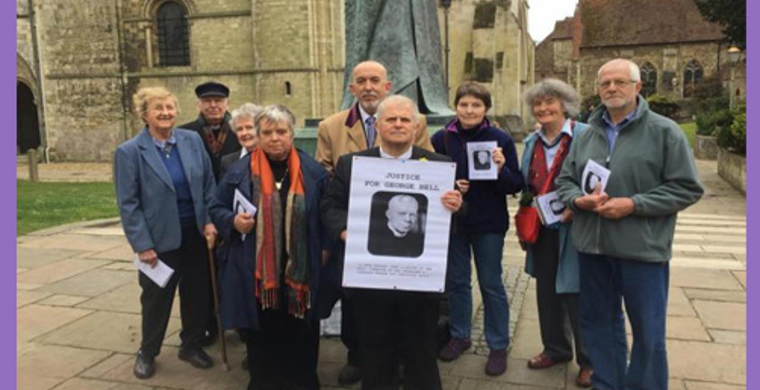Chichester Cathedral moves to restore Bishop George Bell
By Martin Sewell
https://archbishopcranmer.com/
November 24, 2019
When I first began to raise a dissenting voice against poor process at the heart of the Church of England's treatment of the legacy of Bishop George Bell, I knew little about him. I became engaged because there are really only two things that provoke my anger: injustice and stupidity. Little did I realise how much my blood pressure might be put at risk over the subsequent years as time and again we have encountered a series of 'perfect storms' because we simply fail to do the obviously sensible thing.
I am, however, pleased now to report a small victory for a doughty bunch of local campaigners in the Chichester Diocese who have carried the battle for normal standards of fairness on the ground, even as more prominent folk like Peter Hitchens and Charles Moore made the same case in the national press.
The Chichester Cathedral guidebook had included a passage which reflected the Church of England's acceptance of the allegations of child abuse against Bishop George Bell, notwithstanding the conclusions of the two independent reports into the allegations by Lord Carlile and Timothy Briden, which each concluded that the evidential basis for such allegations was unsafe. Setting aside the long established principle of English law that a person is innocent until proven guilty by cogent and compelling evidence, the church had maintained its stance that the allegations could not be ignored, although it tried, unconvincingly, to soften the blow for Bell's admirers by emphasising the many good things about his life and witness.
The new Cathedral guidebook has been published, and there is no mention of the controversial passages in its short summation of the Bishop's biography. Instead, there is a passage concerning Bell's friendship with, and support for, Dietrich Bonhoeffer, the great pastor of the German resistance to Nazism, which is altogether better attested.
We should applaud the Cathedral authorities for this change of heart. It is not easy to change one's mind or to swim against the tide, especially when the Church of England corporately continues to demonstrate inflexibility on so many aspects of tension in this complicated area. We should go further, and hold up the Chichester example as exemplifying good practice in our national church life. Perhaps their example will result in the restoration of the name of the handsome Cathedral Close property given as a specific donation to honour the late Bishop's name, which had been changed as part of the expunging the name of George Bell from the record of local recognition.
This is an important first step for the Church of England, and it is one of principle. The church may espouse eternal values, but its own history of repeated failures are an indelible shame. We are part of a fallen world, and institutionally we have committed our full share of sins of omission and commission. Our former excuses for slavery, antisemitism and homophobic attitudes are obvious examples of past error of which we now repent. Most of our regrets occur when we depart from Christ's golden rule that we should do as we would be done by.
If you or I were accused of great wrong, of such character as to destroy our reputation before right-thinking people, how would we wish to be judged? Surely we would expect sound principle to come to our aid: let there be evidence; let it be weighed by an impartial judge; let the balance be true, and let us agree to abide by the outcome of fair and proper process. It is never perfect, but it is the best we can manage. Insistence on such principles is the foundation of our freedom.
This is not what happened to Bishop George Bell, but at least some who departed from the righteous foundation of liberty have now returned to a position of integrity. They deserve to be praised for their repentance, and their example needs to be commended abroad.
However, one swallow does not make a spring: the Church of England has not yet followed suit. That may be part of a deeper crisis of confidence. It may be that some haven fallen so far that they dare not move until the secular world issues an instruction. In PR terms, waiting to "do what IICSA tells us" is the safest option, but it is a poor alternative to taking the initiative.
At IICSA the Archbishop of Canterbury gave evidence that he had sent a written apology to Fr Matthew Ineson for the poor treatment he has received at the hands of the Church of England. Fr Matthew says he never received it. Both are more likely than not to be telling the truth. So why doesn't somebody at Lambeth Palace organise a duplicate letter to be sent forthwith by recorded delivery, and sort this damned mess out?
Similarly, as the Makin Inquiry into the Smyth and possibly the Fletcher scandals moves slowly apace, the senior figures in the various incarnations of the Iwerne project must know that their prioritisation of brand loyalty over pastoral care, their hardheartedness towards victims and their pride will soon be uncovered. Already several of their Evangelical brothers and sisters have urged them to take the proper course. Repentance and restoration are sound biblical principles, which are urgently needed in this context.
The adjustment of the Chichester Cathedral guidebook may seem a small step on the path to the restoration of the good name and reputation of Bishop George Bell, but it is at least a step. In the words of EF Schumacher: "We must do the right thing because if we don't do the right thing we shall be doing the wrong thing, and if we do the wrong thing we shall no longer be part of the solution but part of the cause."
END














